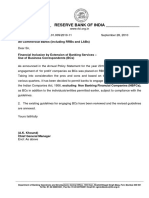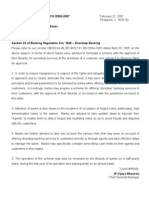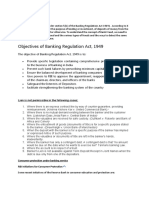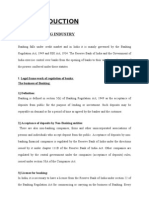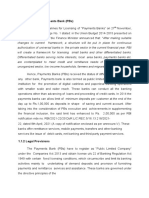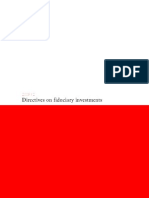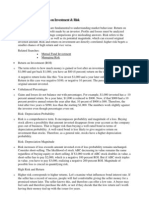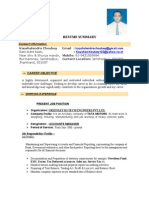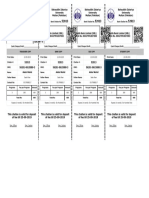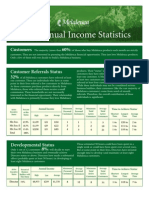0 ratings0% found this document useful (0 votes)
163 viewsRbi Guidelines On Wealth Management, Marketing, Distribution by Banks
Rbi Guidelines On Wealth Management, Marketing, Distribution by Banks
Uploaded by
Ankita NirolaThis document provides guidelines for wealth management, marketing, and distribution services offered by banks in India. It discusses the types of services generally included under wealth management (referral services, investment advisory services, and portfolio management services). It also discusses banks' role in marketing and distributing third-party financial products. The guidelines were drafted to address concerns around mis-selling, conflicts of interest, lack of risk management and compliance with KYC/AML guidelines that could expose banks to reputational risks.
Copyright:
© All Rights Reserved
Available Formats
Download as PDF, TXT or read online from Scribd
Rbi Guidelines On Wealth Management, Marketing, Distribution by Banks
Rbi Guidelines On Wealth Management, Marketing, Distribution by Banks
Uploaded by
Ankita Nirola0 ratings0% found this document useful (0 votes)
163 views20 pagesThis document provides guidelines for wealth management, marketing, and distribution services offered by banks in India. It discusses the types of services generally included under wealth management (referral services, investment advisory services, and portfolio management services). It also discusses banks' role in marketing and distributing third-party financial products. The guidelines were drafted to address concerns around mis-selling, conflicts of interest, lack of risk management and compliance with KYC/AML guidelines that could expose banks to reputational risks.
Original Description:
Rbi Guidelines on Wealth Management,Marketing,Distribution by Banks
Original Title
Rbi Guidelines on Wealth Management,Marketing,Distribution by Banks
Copyright
© © All Rights Reserved
Available Formats
PDF, TXT or read online from Scribd
Share this document
Did you find this document useful?
Is this content inappropriate?
This document provides guidelines for wealth management, marketing, and distribution services offered by banks in India. It discusses the types of services generally included under wealth management (referral services, investment advisory services, and portfolio management services). It also discusses banks' role in marketing and distributing third-party financial products. The guidelines were drafted to address concerns around mis-selling, conflicts of interest, lack of risk management and compliance with KYC/AML guidelines that could expose banks to reputational risks.
Copyright:
© All Rights Reserved
Available Formats
Download as PDF, TXT or read online from Scribd
Download as pdf or txt
0 ratings0% found this document useful (0 votes)
163 views20 pagesRbi Guidelines On Wealth Management, Marketing, Distribution by Banks
Rbi Guidelines On Wealth Management, Marketing, Distribution by Banks
Uploaded by
Ankita NirolaThis document provides guidelines for wealth management, marketing, and distribution services offered by banks in India. It discusses the types of services generally included under wealth management (referral services, investment advisory services, and portfolio management services). It also discusses banks' role in marketing and distributing third-party financial products. The guidelines were drafted to address concerns around mis-selling, conflicts of interest, lack of risk management and compliance with KYC/AML guidelines that could expose banks to reputational risks.
Copyright:
© All Rights Reserved
Available Formats
Download as PDF, TXT or read online from Scribd
Download as pdf or txt
You are on page 1of 20
GUIDELINES ON WEALTH MANAGEMENT/MARKETING/DISTRIBUTION
SERVICES OFFERED BY BANKS- DRAFT
Introduction
1.1 The term Wealth Management comprises a number of aggregated financial
services. The following categories of services offered by banks in India to their
customers are generally included in the term Wealth Management Services
(WMS):
i) Referral Services
ii) Investment Advisory Services (IAS); and
iii) Portfolio Management Services (PMS).
In addition to the above services, banks also market and distribute third party
financial products, which, though not part of WMS, is an allied activity. The particular
business model adopted by individual banks may differ in terms of products and
services offered, corporate structure, clients targeted and revenue generated,
1.2 Though these services are offered by banks, Investment Advisory as well as
Portfolio Management Services are regulated by SEBI. Similarly, in offering referral
services for insurance, banks are required to comply with relevant IRDA regulations.
While marketing and distributing third party financial products, banks are acting as
agents for entities regulated by other regulators. Reserve Bank has also issued
guidelines for banks on these matters from time to time from the perspective of
permitting entities regulated by RBI to undertake these activities.
1.3 Over time, there has been an expansion of the roles and responsibilities of
banks as providers of these services. Concerns arising out of mis-selling, conflict of
interest, requirement of grievance redressal, etc, have arisen and after debate in
inter-regulatory forums it was decided to issue guidelines addressing the same.
Further, in the recent investigations undertaken by RBI in the light of reported
allegations that certain banks were involved in structuring transactions to aid tax
evasion and fraudulent transfer of funds, it was observed that many of these
transactions centered around the WMS provided by banks as well as marketing of
third party products. The main regulatory concerns have arisen regarding violation of
KYC/AML guidelines, mis-selling of products or selling of products that are
2
unsuitable for the client, conflict of interest between the marketing and advisory/
financial management function, and lack of robust risk management systems and
procedures leading to frauds.
1.4 Mis-selling raises serious consumer protection issues. Further, as observed from
the recent allegations, WMS activities as well as marketing third party products can
expose banks to serious reputational risks. These Guidelines define the scope of
these services.
2. Current Regulatory Prescriptions
2.1 Marketing and Distribution of third party products
2.1.1 Marketing and distribution of financial products are undertaken by banks by
acting as agents of the third party financial services provider. Initially, banks were
permitted to undertake retailing of government securities, subject to certain
conditions, since it was felt that with the large network of branches, banks would be
in a position to enlarge the market for Government securities which would, in turn,
help in activating the secondary market for Government securities and making the
market for such securities deep and broad-based.
2.1.2 Later, banks were permitted to market mutual funds, subject to the following
conditions:
(i) Banks should only act as an agent of the customers, forwarding the investor's
applications for purchase/sale of MF units to the Mutual Fund/the Registrars/the
transfer agents. The purchase of units should be at the customers' risk and
without the bank guaranteeing any assured return.
(ii) Banks should not acquire units of Mutual Funds from the secondary market.
(iii) Banks should not buy back units of mutual funds from their customers.
(iv) If banks propose to extend any credit facility to individuals against the
security of shares or units of Mutual Funds, sanction of such facility should be in
accordance with the extant instructions on advances against shares, debentures
and units of mutual funds.
3
(v) Banks holding custody of MF units on behalf of their customers should
ensure that their own investments and investments belonging to their customers
are kept distinct from each other.
(vi) Banks should put in place adequate and effective control mechanisms as
detailed in our circular DBOD.No.FSC BC.143A/24.48.001/91-92 dated June 20,
1992. Besides, with a view to ensuring better control, retailing of units of mutual
funds may be confined to certain selected branches of a bank.
2.1.3 Subsequently, it was decided to grant banks general permission for engaging
in insurance agency business, subject to the following conditions:
(i) The bank should comply with the IRDA regulations for acting as composite
corporate agent with insurance companies.
(ii) The bank should not adopt any restrictive practice of forcing its customers to
go in only for a particular insurance company in respect of assets financed by the
bank. The customers should be allowed to exercise their own choice.
(iii) As the participation by a banks customer in insurance products is purely on
a voluntary basis, it should be stated in all publicity material distributed by the
bank in a prominent way. There should be no linkage either direct or indirect
between the provision of banking services offered by the bank to its customers
and use of the insurance products.
(iv) The risks, if any, involved in insurance agency should not get transferred to
the business of the bank.
2.1.4 Banks may be marketing / referring several competing products of various
mutual fund / insurance / financial companies to their customers. Keeping in view the
need for transparency in the interest of the customers to whom the products are
being marketed / referred, banks were advised to disclose to the customers, details
of all the commissions / other fees (in any form) received, if any, from the various
mutual fund / insurance / other financial companies for marketing / referring their
products. This would be required even if the bank is marketing the products of only
one mutual fund/company.
4
2.2 Referral Services
2.2.1 It was envisaged that under the referral arrangement, banks would provide
physical infrastructure within their select branch premises to insurance companies
for selling their insurance products to the banks customers with adequate disclosure
and transparency, and in turn earn referral fees on the basis of premia collected.
Initially, banks were permitted to undertake insurance referral business after
obtaining specific permission from RBI and IRDA. It was later decided that banks
need not obtain prior approval of RBI for engaging in insurance referral business
without any risk participation. Banks were advised to enter into Agreements with the
insurance company for allowing use of premises and making use of the existing
infrastructure of the bank. They were also advised to comply with the IRDA
regulations for referral arrangement with insurance companies, in addition to the
stipulations mentioned at para 2.1.3 above, viz, they should not adopt any restrictive
practice of forcing its customers to go in only for a particular insurance company in
respect of assets financed by the bank. The customers should be allowed to
exercise their own choice. As the participation by a bank's customer in insurance
products is purely on a voluntary basis, it should be stated in all publicity material
distributed by the bank in a prominent way. There should be no 'linkage' either direct
or indirect between the provision of banking services offered by the bank to its
customers and use of the insurance products.
2.2.2 This permission was later expanded to permit banks to offer referral services
to their customers for financial products subject to the following conditions:
i) The bank/third party issuers of the financial products should strictly adhere to
the Know Your Customer (KYC) norms / Anti-Money Laundering (AML)
standards/Combating of Financing of Terrorism (CFT)/Obligation of banks under
PMLA, 2002 guidelines in respect of the customers who are being referred to the
third party issuers of the products. In this context, KYC/AML Guidelines provided
inter alia, that since information provided by the customer for KYC compliance
while opening an account is confidential and divulging any details thereof for cross
selling or any other purpose would be in breach of customer confidentiality
obligations, banks were, advised to collect any information about the customer for
a purpose other than KYC requirements, separately, purely on a voluntary basis,
5
after explaining the objectives to the customer and taking express approval for the
specific uses to which such information could be put.
ii) The bank should ensure that the selection of third party issuers of the
financial products is done in such a manner so as to take care of the reputational
risks to which the bank may be exposed in dealing with the third party issuers of
the products.
iii) The bank should make it explicitly clear upfront to the customer that it is
purely a referral service and strictly on a non-risk participation basis.
iv) The third party issuers should adhere to the relevant regulatory guidelines
applicable to them.
v) While offering referral services, the bank should strictly adhere to the
relevant RBI guidelines
2.2.3 The instructions at para 2.1.4 regarding transparency and disclosure would
also apply to banks offering referral services, viz, they were advised to disclose to
the customers, details of all the commissions / other fees (i n any form) received, if
any, from the various mutual fund / insurance / other financial companies for
referring their products. This would be required even if the bank is referring the
products of only one mutual fund/company.
2.3 Investment Advisory Services (IAS)
Prior to the issue of SEBI (Investment Advisers) Regulations 2013, the activity of
investment advisory services was regulated as per SEBI (Portfolio Managers) Rules
and Regulations, 1993. Banks, carrying out investment advisory services, require
prior approval of RBI, which is issued on a case -to-case basis, subject to certain
conditions.
2.4 Portfolio Management Services (PMS)
2.4.1 The activity of PMS is regulated by SEBI as per SEBI (Portfolio Managers)
Rules and Regulations, 1993. Consequent to certain irregularities observed in the
6
securities transactions of banks, general powers given to banks to operate Portfolio
Management Schemes (PMS) and similar schemes were withdrawn and banks were
advised not to restart or introduce any new PMS or similar schemes in future without
obtaining prior approval of RBI, vide circular No. DBOD.BC.73/27.07.001/94-95
dated June 7, 1994. These instructions were also made applicable to subsidiaries of
banks, including bank-sponsored NBFCs.
2.4.2 The conditions under which banks could offer PMS are as under:
i) Only those banks which can provide such services on their own should
undertake the activity. Funds accepted for portfolio management from their
clients, should not be entrusted to another bank for management.
ii) PMS should be in the nature of investment consultancy/management, for
a fee, entirely at the customers risk without guaranteeing, either directly or
indirectly, a pre-determined return. The bank should not indemnify the client
directly or indirectly in any manner in the event of the bank not being able to
achieve the minimum stipulated rate of return specified, if any, in the agreement.
The bank should charge definite fee for the services rendered independent of the
return to the client (i.e. benefit earned or losses incurred by the client on account
of acting on the advice of the bank).
iii) PMS should be provided to the clients in respect of the latters long term
investable funds. Funds should not be accepted for portfolio management for a
period less than one year. In case of placement of funds for portfolio
management by the same client on more than one occasion on a continuous
basis, each such placement should be treated as a separate account and each
such placement should be for a minimum period of one year.
iv) Portfolio funds should not be deployed for lending in call/notice money;
interbank term deposits and bills rediscounting markets and lending to/placement
with corporate bodies.
v) Banks should maintain client wise account/record of funds accepted for
management and investments made thereagainst and all credits (including
realized interest, dividend etc) and debits relating to the portfolio account should
be put through such account. The tax deducted at source in respect of
interest/dividend on securities held in the portfolio account should be reflected in
7
the portfolio account. The account holder should be entitled to get a statement of
the portfolio account.
vi) Bank's own investments and investments belonging to PMS clients should
be kept distinct from each other, and any transactions between the bank's
investment account and client's portfolio account should be strictly at market rates.
vii) In case of transactions relating to PMS clients account, although the bank
could hold the securities belonging to the portfolio account in its own name on
behalf of its PMS clients, all the relative records should give a clear indication that
the transaction belongs to PMS clients and does not belong to banks own
Investment Account.
viii) In the banks general ledger, a Clients Portfolio Account should be
maintained and all the funds received by it for portfolio management should be
reflected in it on a day-to-day basis. The balance lying in this account (i.e the
funds undeployed, if any, from this account) should be treated as outside
borrowings of the bank and it should maintain Cash Reserve Ratio/Statutory
Liquidity Ratio on such funds.
ix) The banks liability to its clients in respect of funds accepted by it for
portfolio management should be properly reflected in the published books of
accounts of the bank/subsidiary.
x) There should be a clear functional separation of trading and back office
functions relating to banks own investment accounts and PMS clients' accounts.
PMS clients' accounts should be subjected by banks to a separate audit by
external auditors.
xi) Violation of these instructions would be viewed seriously and invite deterrent
action against the banks, which would include raising of reserve requirements,
withdrawal of facility of refinance from the RBI and denial of access to money
markets, apart from prohibition from undertaking PMS activity.
xii) These instructions apply, mutatis mutandis, to the subsidiaries of banks
except where they are contrary to specific regulations of RBI or SEBI governing
their operations.
8
xiii) Banks / subsidiaries of banks operating PMS or similar schemes with the
specific prior approval of the RBI are also required to comply with the guidelines
contained in the SEBI (Portfolio Managers) Rules and Regulations, 1993 and
those issued from time to time.
xiv) Apart from the conditions stipulated above, in the case of bank subsidiaries
offering discretionary PMS, banks were advised to ensure that the Board of the
bank lays down appropriate risk management policy for the subsidiary which is
effectively implemented by the subsidiary.
A list of circulars on the subjects referred to in the above paragraphs is enclosed as
Appendix.
3. Proposed Guidelines on Wealth Management Services as well as the
Marketing/Distribution services offered by Banks
A comprehensive review of the existing Guidelines has been undertaken in view of
the concerns stated in para 1.3 and 1.4 above. As stated therein, the major concerns
arise from consumer protection issues involving conflict of interest, mis-selling and
lack of adequate grievance resolution mechanism, and exposure to operational risk
arising from weak internal control mechanisms.
3.1 Marketing/Distribution of financial products and services
3.1.1 Although traditionally, the agency model for marketing and distributing third
party products is without risk participation since the sales are on behalf of the issuer
of the third party financial products, in case of a bank acting as distributor, the
customers expectation from a bank in terms of the banks credibility is significantly
different than that of any other agent of the product issuer. Thus banks are expected
to take greater care while undertaking such services, including avoiding mis-selling.
3.1.2 Mis-selling of products and services occurs when products that are unsuitable
to the client profile are sold to him, particularly through misrepresentation or by
linking it with banks own products e.g., making purchase of insurance compulsory
along with a car loan. Mis-selling can arise either from lack of knowledge of the
product being sold, and occurs when untrained staff sell products. It may also arise
9
from the provisions regarding payment of commissions and incentives which distort
the selling structure. In the recent investigations undertaken by RBI referred to
above, it was observed that in some cases, banks did not have clear segregation of
duties of marketing personnel from other branch functions, and bank employees
were directly receiving incentives from third parties such as insurance, mutual fund
and other entities for selling their products.
3.1.3 Section 10(1)(b)(ii) of the BR Act, 1949 prohibits a bank from employing or
continuing the employment of any person whose remuneration or part of the
remuneration takes the form of commission or of a share in the profits of the bank,
save as exempted in the Proviso thereto. Accordingly, payment of a portion of the
commission earned on marketing and distribution of third party products by the bank
to the staff would fall under the said prohibition.
3.1.4 While banks may act as agents of third-party issuers of financial products
and services on fee basis, without any risk participation, additional safeguards are
necessary. Accordingly, the following conditions are prescribed in addition to the
extant instructions:
i) As mis-selling is a serious issue in terms of consumer protection, the bank
should put in place a policy approved by its Board regarding marketing and
distribution of third party financial products which should, inter alia specifically
consider the issue of addressing mis-selling.
ii) Banks may only undertake marketing and distribution of financial products
and services. The third party product issuer should be a regulated financial entity
in India.
iii) The bank should adhere to the guidelines laid down by the sector specific
regulator for its agency business.
iv) Persons undertaking marketing/distribution services of third party financial
products should have suitable professional qualification for carrying out the role.
There should be a system of continuous development & training (internal as also
external) of such persons so that they may understand the complexity of the
product.
10
v) The sales process should be transparent with full disclosure as to the details
of the product. The selling should be need based and mapped to the customer
profile.
vi) Products should be marketed only in branches having specified trained
personnel for the purpose.
vii) The persons undertaking such marketing/distributions services, should not
be entrusted with any other approval/transactional process at bank branches.
There should be a clear segregation of functions between marketing and
operational staff.
viii) There should be a Code of Conduct for the sales personnel who should
adhere to the same.
ix) The fact that the bank is acting only as an agent should be clearly brought
to the notice of the customer.
x) The bank should set up robust internal grievance redressal machinery for
resolving issues related to mis-selling, agency services, service defaults etc.
xi) It may be ensured that there is no violation of Section 10(1) (ii) of the BR Act
1949 in payment of commissions/incentives as well as of Guidelines issued by
the regulator of the third party issuer. No incentive (cash or non-cash) linked
directly or indirectly to the income received from marketing and distribution
function should be paid to the staff engaged in marketing/distribution services of
third party products. The staff of the bank is also not permitted to receive any
incentive (cash or non-cash) directly from the third party issuer. Banks must
ensure that there is no violation of the above in the incentive structure to staff.
xii) The bank should adhere strictly to all KYC/AML Guidelines as issued from
time to time on the matter.
xiii) Transactions above Rs 50000 for these products should only be accepted
through debit to customers account with the bank and not in cash/cheque of other
banks. There should be no evasion of these regulations by accepting several
amounts for lower values from the same client to avoid the stated threshold.
xiv) Banks should disclose to the customers, details of all the commissions/other
fees (in any form) received, if any, from the various mutual fund/insurance/other
11
financial companies for marketing their products. This disclosure would be
required even in cases where the bank is marketing products of only one mutual
fund/ insurance company etc.
xv) Banks should disclose in the Notes to Accounts to their Balance Sheet,
the details of fees/remuneration received in respect of the marketing and
distribution function undertaken by them.
3.2 Segregation of WMS activities of the bank by setting up of a Seperately
Identifiable Department or Division(SIDD)
3.2.1 Conflict of interest arises mainly from the juxtaposition of the
marketing/distribution function and the advisory or funds management function. To
address the issue of conflict of interest arising from the single entity conducting both
the activities of advisory/fund management as well as marketing, it is proposed to
segregate the two functions.
3.2.2 Accordingly, banks may conduct all WMS activities, i.e., referral, IAS and
PMS either from a separate subsidiary or through a Separately Identifiable
Department or Division (SIDD) set up for the purpose. Banks would require prior
approval of RBI before undertaking WMS services whether through a subsidiary or a
SIDD and would have to comply with the following requirements in both cases.
The specific prescriptions in this regard are as under:
i) Such subsidiary/SIDD would require to be registered with SEBI and comply
with SEBI Guidelines regarding provision of these services, including code of
conduct if any prescribed.
ii) There should be a strictly defined and clear demarcation between the other
departments of the bank and the SIDD. It should be ensured that there is no
intermingling of the distribution and advisory role in case a bank is undertaking
both the activities.
iii) There should be an arms length relationship between the bank and the
subsidiary if WMS is being undertaken through the subsidiary.
12
iv) Persons manning the SIDD/subsidiary should have suitable professional
qualification for carrying out the role of Investment Advisor /Financial
Advisor/Portfolio Manager. There should be a system of continuous development
& training (internal as also external) of such persons.
v) While the specific activity of financial advisory services/portfolio
management will be regulated by SEBI, the Reserve Bank would continue to
supervise the bank for all its activities including those undertaken through the
SIDD.
vi) The bank/subsidiary should set up robust internal grievance redressal
machinery for resolving issues related to services offered.
vii) The bank/subsidiary should formulate a board approved customer
compensation policy in case of complaints related to services offered.
viii) Banks/subsidiaries should disclose to the customers, details of all the
commissions/other fees (in any form) received, if any, from the various mutual
fund/insurance/other financial companies for marketing their products. This
disclosure would be required even in cases where the bank is marketing products
of only one mutual fund/ insurance company etc.
ix) The instructions/ guidelines on KYC/AML/ CFT applicable to banks, issued
by RBI from time to time, may be adhered to, in respect of customers to whom
the services of referral/IAS/PMS are being provided.
x) Banks may, through the SIDD/subsidiary, provide services only in respect
of financial services and products offered by regulated financial services entites.
xi) Violation of the instructions regarding undertaking of referral/IAS/PMS
business by banks/subsidiaries will be viewed seriously and may invite deterrent
action against the banks, which could include raising of reserve requirements,
withdrawal of facility of refinance from the RBI and denial of access to money
markets, apart from prohibition from undertaking referral/IAS/PMS activity.
3.3 Grievance Redressal Mechanism
Irrespective of the nature of the service offered, i.e., sale of third party products,
advisory, referral or fund management, or the form in which it is provided, whether
13
departmentally or through subsidiary or through SIDD, the bank must put in place a
robust customer grievance redressal mechanism which should form part of the
Board approved policy.
3.4 Operational Risk
Similarly, banks should put in place sound internal control mechanisms and a system
of checks to address risk management.
4. Specific Guidelines pertaining to Wealth Management Services
Apart from the above, guidelines on the specific Wealth Management Services
offered by banks are enhanced and detailed as under:
4.1 Referral Services
4.1.1 Referral activities are those where the bank refers its customers to third party
issuers of the financial products and services including those offered by bank
subsidiaries/entities who are part of the same group. Under the referral arrangement,
banks may also have a specific agreement with the third party issuer for sharing of
customer information apart from providing physical infrastructure within select branch
premises for selling their products and, in turn, earn referral fees.
4.1.2 In the Report of the Committee on Bancassurance, 2011, IRDA had
observed that there were several irregularities in the referral arrangements entered
into by insurance companies with banks due to obliteration of the difference between
corporate agency and referral business and regulatory arbitrage enabling
circumvention of the cap on commissions and training requirements. In some cases,
the referral banks were actually soliciting the customers for sale of insurance through
untrained staff. As stated in the Report, this had prompted IRDA to permit only those
banks which are not eligible to undertake corporate agency business to register as
referral companies in terms of the IRDA (Sharing of database for distribution of
insurance products) Regulations, 2010.
14
4.1.3 As the differences between services provided under referral model and those
provided under agency model have blurred in many cases, banks are perceived to
be operating as agencies while in reality they may be providing only referral services.
There are also instances where customer information has been shared with third-
party issuers without obtaining an explicit consent or where the customer was not
provided with the option of refusing to give consent for sharing personal information.
Such practices have serious consequences leading to reputation risk to the banks. It
is therefore proposed that banks shall not be permitted to enter into specific referral
agreements with third party issuers of products and services.
4.1.4 However, if a customer requests a bank regarding obtention of financial
products/services, there will not be any objection to banks referring them to providers
of such services.
4.2 Investment Advisory Services (IAS)
4.2.1 The SEBI(Investment Advisors) Regulations 2013, defines an investment
adviser as any person, who for consideration, is engaged in the business of
providing investment advice to clients or other persons or group of persons and
includes any person who holds out himself as an investment adviser, by whatever
name called. Further investment advice is defined as advice relating to investing in,
purchasing, selling or otherwise dealing in securities or investment products, and
advice on investment portfolio containing securities or investment products, whether
written, oral or through any other means of communication for the benefit of the
client and shall include financial planning. All investment advisors will be required to
obtain a certificate of registration from SEBI under these Regulations. Accordingly
all banks and bank sponsored subsidiaries offering Investment Advisory Services will
require to be registered with SEBI and comply with the provisions of the SEBI
Investment Advisors Regulations.
4.2.2 Banks may offer Investment Advisory Services (IAS), after obtaining specific
prior approval of RBI (DBOD), subject to the following conditions:
15
i) Banks may offer Investment Advisory Services (IAS) only through a
Separately Identifiable Department or Division (SIDD) which will conform to the
prescriptions stated at para 3.2.2 above.
ii) The bank offering IAS (through the SIDD) should be registered under the
SEBI (Investment Advisers) Regulations 2013 and shall adhere to all SEBI
prescribed regulations including the code of conduct formulated thereunder.
iii) The services offered should be purely advisory in nature. The bank should
not, under any circumstance, accept funds from the clients for management.
iv) The bank should not indemnify, directly or indirectly, for any losses incurred
by the client as a result of acting on the advice of the bank. The agreement
entered into with the client should provide a clause to this effect.
v) The bank should charge a definite fee for the services rendered independent
of any benefit or losses incurred by the client on account of acting on the advice
of the bank. The bank should issue a suitable disclaimer in this regard.
4.2.3 Investment Advisory Services (IAS) by bank sponsored subsidiaries
4.2.3.1 Bank-sponsored subsidiaries offering/desirous of offering IAS, may follow
the following guidelines:
i) The sponsor-bank should obtain specific prior approval of DBOD before
offering Investment Advisory Services through an existing subsidiary or for setting
up a subsidiary for this purpose. This would also be applicable to a foreign bank,
having presence in India as a branch and desirous of offering IAS through its
subsidiary. (Setting up of any subsidiary will, as hitherto, be subject to the extant
guidelines on para-banking activities of banks).
ii) The subsidiary offering IAS should be registered under the SEBI (Investment
Advisers) Regulations 2013 and shall adhere to all SEBI prescribed regulations
including the code of conduct formulated thereunder.
iii) The subsidiary is permitted to offer IAS to their customers only on products
or services which a bank can offer.
16
iv) The instructions/ guidelines on KYC/AML/ CFT, issued by the regulator of
the subsidiary, as amended from time to time, may be adhered to, in respect of
customers to whom the service of IAS is being provided.
4.3 Portfolio Management Services (PMS)
4.3.1 The activity of PMS is regulated by SEBI as per SEBI (Portfolio Managers)
Rules and Regulations, 1993 wherein a portfolio manager is defined as any person
who pursuant to a contract or arrangement with a client, advises or directs or
undertakes on behalf of the client (whether as a discretionary portfolio manager or
otherwise) the management or administration of a portfolio of securities or the funds
of the client, as the case may be. As stated above, banks may undertake PMS only
through a Separately Identifiable Department or Division (SIDD) or a subsidiary.
PMS can be either discretionary or non-discretionary in nature.
4.3.2 PMS-Non-Discretionary
4.3.2.1 The non-discretionary portfolio manager manages the funds in accordance
with the directions of the client. Thus under Non-Discretionary PMS, the portfolio
manager will provide advisory services enabling the client to take decisions with
regards to the portfolio. The choice as well as the timings of the investment decisions
rest solely with the investor. However the execution of the trade is done by the
portfolio manager. Since in non-discretionary PMS, the portfolio manager manages
client portfolio/funds in accordance with the specific directions of the client, the PMS
Manager cannot act independently.
4.3.2..2 Banks may offer non-discretionary portfolio management services, after
obtaining specific prior approval of RBI (DBOD), subject to the following conditions:
i) All banks offering Portfolio Management Services (PMS) will be registered with
SEBI and regulated as per SEBI (Portfolio Managers) Rules and Regulations, 1993
and shall adhere to all SEBI prescribed regulations including the code of conduct
formulated thereunder.
ii) Banks may undertake PMS only through a Separately Identifiable Department
or Division (SIDD) and will comply with all prescriptions regarding the SIDD as stated
in para 3.1 above.
17
iii) Only those banks which can provide such services on their own should
undertake the activity. Funds accepted for portfolio management from their clients
should not be entrusted to another bank for management.
iv) PMS should be in the nature of investment consultancy / management, for a
fee, entirely at the customers risk without guaranteeing, either directly or indirectly, a
pre-determined return. The bank should not indemnify the client directly or indirectly
in any manner in the event of the bank not being able to achieve the minimum
stipulated rate of return specified, if any, in the agreement. The bank should charge
definite fee for the services rendered independent of the return to the client (i.e.
benefit earned or losses incurred by the client on account of acting on the advice of
the bank).
vii) PMS should be provided to the clients in respect of the latters long term
investable funds. Funds should not be accepted for portfolio management for a
period less than one year. In case of placement of funds for portfolio management by
the same client on more than one occasion on a continuous basis, each such
placement should be treated as a separate account and each such placement
should be for a minimum period of one year. There will, however, be no objection to
shuffling of relative investments during this period.
viii) Portfolio funds should not be deployed for lending in call/notice money; inter-
bank term deposits and bills rediscounting markets and lending to/placement with
corporate bodies.
ix) Banks should maintain client wise account/record of funds accepted for
management and investments made there against and all credits (including realized
interest, dividend etc) and debits relating to the portfolio account should be put
through such account. The tax deducted at source in respect of interest/dividend on
securities held in the portfolio account should be reflected in the portfolio account.
The account holder should be entitled to get a statement of the portfolio account.
x) Banks own investments and investments belonging to PMS clients should be
kept distinct from each other, and any transactions between the banks investment
account and clients portfolio account should be strictly at market rates.
xi) In case of transactions relating to PMS clients Account, although the bank
could hold the securities belonging to the portfolio account in its own name on behalf
18
of its PMS clients, all the relative records should give a clear indication that the
transaction belongs to PMS clients and does not belong to banks own Investment
Account.
xii) In the banks general ledger, a Clients Portfolio Account should be maintained
and all the funds received by it for portfolio management should be reflected in it on
a day-to-day basis. The balance lying in this account (i.e the funds un-deployed, if
any, from this account) should be treated as outside borrowings of the bank and
should be reckoned for calculation of Cash Reserve Ration/Statutory Liquidity Ratio.
xiii) The banks liability to its clients in respect of funds accepted by it for portfolio
management should be properly reflected in the published books of accounts of the
bank.
xiv) There should be a clear functional separation of trading and back office
functions relating to banks own investment accounts and PMS clients accounts.
PMS clients accounts should be subjected by banks to a separate audit by external
auditors.
xv) Acceptance of funds by banks from their clients for management, by whatever
scheme/name, other than deposits for specific periods which are subject to RBIs
interest rate directives, should be subject to the RBIs guidelines on PMS. In other
words, apart from deposit taking, the banks should accept funds from their clients for
management only under the terms and conditions stipulated for the PMS and not
under any other scheme.
4..3.2.3 Portfolio Management Services (PMS)- Discretionary:
The discretionary portfolio manager individually and independently manages the
funds of each client in accordance with the needs of the client. Under discretionary
PMS, independent charge is given by the client to the portfolio manager to manage
the portfolio/funds. The discretionary Portfolio Management Service also includes
portfolios broadly directed by the customer or those wherein the customer gives a
negative list of investment products at the time of opening the account so that the
Fund Manager ensures that such investment products are not included in the
portfolio.
Banks are prohibited from offering discretionary portfolio management services.
19
4.3.2.4 Portfolio Management Services (PMS) by bank sponsored
subsidiaries
Bank sponsored subsidiaries (domestic and overseas) may offer discretionary PMS,
subject to the following conditions in addition to the conditions stated at 4.3.2.2.
above for banks which will apply to their subsidiaries also :
i) The sponsor-bank should obtain specific prior approval of DBOD before offering
Portfolio Management Services through an existing subsidiary or for setting up a
subsidiary for this purpose. This would also be applicable to a foreign bank, having
presence in India as a branch and desirous of offering PMS through its subsidiary.
(Setting up of any subsidiary will, as hitherto, be subject to the extant guidelines on
para-banking activities of banks).
ii) All bank sponsored subsidiaries offering Portfolio Management Services (PMS)
will be registered with SEBI and regulated as per SEBI (Portfolio Managers) Rules
and Regulations, 1993 and shall adhere to all SEBI prescribed regulations including
the code of conduct formulated thereunder.
iii) There should be an arms length relationship between the bank and the
subsidiary.
v) The instructions/ guidelines on KYC/AML/ CFT applicable to the subsidiary,
issued by the concerned regulator, as amended from time to time, may be adhered
to, in respect of customers to whom the service of PMS is being provided.
5. Timeline for re-organization
Banks, including their subsidiaries, who are already undertaking the above activities,
may reorganize their structure in accordance with the final guidelines within a period
of one year from the date of issue of final Guidelines on the subject.
20
APPENDIX
List of Circulars consolidated in the draft guidelines on Wealth
Management /Marketing /Distribution Services Offered by banks
No Circular No. Date Subject
1. Mailbox clarification March 25,
2006
Marketing / Distribution of
Mutual Fund / Insurance etc.
products by Banks
2. DBOD.No.FSD.BC.60/24.01.001/2009-
10
November
16, 2009
Marketing/Distribution of
Mutual Fund/ Insurance etc.,
Products by Banks
3. DBOD.No.FSC.BC.74/24.76.002/95-96 June 13,
1996
Marketing of Mutual Fund
Units by banks
4. DBOD.No.FSC.BC.129/24.76.002/97 October
22, 1997
Retailing of Government
Securities
5. DBOD.No.FSC.BC.129/24.76.002/97 June 8,
1996
Retailing of Government
Securities
6. DBOD .No. FSD. BC.67/24.0 1.001/2009-
10
January 07,
2010
Disclosure in Balance Sheet-
Bancassurance Business
7. DBOD.FSC.BC.27/24.01.018/ 2003-
2004
September
22, 2003
Entry of banks into
Insurance business
8. DBOD.FSC.BC/16/24.01.018/ 2000-
2001
August 9,
2000
Entry of banks into
Insurance business
9. DBOD.No.FSC.BC.118/24.76.002/98 December
26, 1998
Information System for
Portfolio Management
Services (PMS)
10. DBOD.No.BC.73/27.07.001/94-95 June 7,
1994
Acceptance of deposits
under Portfolio Management
Scheme (PMS)
11. DBOD.No.BC.183/27.07.003/93-94 October
18, 1993
Information System for
Portfolio Management
Services (PMS)
12. DBOD.No.BC.11/24.01.009/92-93 July 30,
1992
Portfolio Management on
behalf of banks
13. DBOD.No.FSC.BC.69/469-90/91 January
18, 1991
Portfolio Management on
behalf of clients
14. DBOD.No.BP.(FSC)BC.120/C.469-89 May 2,
1989
Portfolio Management on
behalf of clients
15. DBOD.No.Dir.BC.43/C.347-87 April 15,
1987
Portfolio Management on
behalf of clients
You might also like
- Bokaro Steel Plant - ProjectDocument72 pagesBokaro Steel Plant - Projectchandan97150% (2)
- CONTRACT For Accounting FirmDocument5 pagesCONTRACT For Accounting FirmChow Galan100% (2)
- FAQs 2013 On The Philippine Government Procurement Reform Act: Digital Edition (Unofficial)Document53 pagesFAQs 2013 On The Philippine Government Procurement Reform Act: Digital Edition (Unofficial)Ed Sabalvoro MPA100% (4)
- Updated 2018 Good Governance BlueprintDocument73 pagesUpdated 2018 Good Governance BlueprintNYC Service100% (1)
- GT Concise Banca Committee ReportDocument8 pagesGT Concise Banca Committee ReportgirishtiwaskarNo ratings yet
- Concise Banca Committee ReportDocument8 pagesConcise Banca Committee ReportgirishtiwaskarNo ratings yet
- What Is Merchant BankingDocument7 pagesWhat Is Merchant Bankingdevrath1989No ratings yet
- Reserve Bank of India - : All Commercial Banks (Including Rrbs and Labs)Document7 pagesReserve Bank of India - : All Commercial Banks (Including Rrbs and Labs)IrshadAhmedNo ratings yet
- Compilation Banking LawDocument27 pagesCompilation Banking LawKoffi DenaqNo ratings yet
- Guidelines On Credit Default Swaps (CDS) For Corporate BondsDocument15 pagesGuidelines On Credit Default Swaps (CDS) For Corporate BondsPsanitha RaoNo ratings yet
- Cds Guidelines RBIDocument14 pagesCds Guidelines RBIJaiprakash ToshniwalNo ratings yet
- Discussion Paper Engagement of For-Profit' Companies As Business CorrespondentsDocument23 pagesDiscussion Paper Engagement of For-Profit' Companies As Business Correspondentsmessi5No ratings yet
- Co-Lending Policy Dated 04022021Document11 pagesCo-Lending Policy Dated 04022021patruni sureshkumarNo ratings yet
- Increasing Inflationary ImpactDocument3 pagesIncreasing Inflationary ImpactAdi ButtNo ratings yet
- Banking Notes BBA PDFDocument19 pagesBanking Notes BBA PDFSekar Murugan50% (2)
- Code-of-Conduct-V3 Belstar - inDocument7 pagesCode-of-Conduct-V3 Belstar - inhans palNo ratings yet
- DoorDocument4 pagesDoorapi-3807149No ratings yet
- 45ML010712F ADocument74 pages45ML010712F APunam NathjogiNo ratings yet
- Guidelines On Mobile Financial ServicesDocument4 pagesGuidelines On Mobile Financial ServicesAhsan ZamanNo ratings yet
- PPBADocument5 pagesPPBAMANISHNo ratings yet
- Non Fund Based FacilitiesDocument13 pagesNon Fund Based FacilitiesrudraarjunNo ratings yet
- Banking ServicesDocument12 pagesBanking ServicesD. BharadwajNo ratings yet
- CM - CHPT 1 NOTESDocument12 pagesCM - CHPT 1 NOTESPranav ChandaneNo ratings yet
- Services Provided by Merchant BanksDocument4 pagesServices Provided by Merchant BanksParul PrasadNo ratings yet
- Chapter 1Document9 pagesChapter 1AliansNo ratings yet
- Unit - II: Merchant BankingDocument38 pagesUnit - II: Merchant BankingashishNo ratings yet
- Tannan - PB and SFBDocument7 pagesTannan - PB and SFBz5bp8jgb2kNo ratings yet
- IC Circular Letter 2015 - 20Document24 pagesIC Circular Letter 2015 - 20Nash Ortiz LuisNo ratings yet
- Introduction For Banking Week Module 6 CCP 2023 by Dean NatukundaDocument18 pagesIntroduction For Banking Week Module 6 CCP 2023 by Dean Natukundadeannatukunda82No ratings yet
- Credit CardsDocument20 pagesCredit CardsNitinAggarwalNo ratings yet
- BancassuranceDocument76 pagesBancassurancekevalcool25050% (2)
- A. Nature of Operations (PSA 315 A22)Document8 pagesA. Nature of Operations (PSA 315 A22)HUERTAZUELA ARANo ratings yet
- Master Circular Û Know Your Customer (KYC) NormsDocument64 pagesMaster Circular Û Know Your Customer (KYC) NormsShaswat RaiNo ratings yet
- RevisedCodeofConductforMutualFundDistributors April2022Document7 pagesRevisedCodeofConductforMutualFundDistributors April2022diciti9741No ratings yet
- Bank of IndiaDocument36 pagesBank of IndiaRuchi_Gulati_4764No ratings yet
- Credit Card Policy Retail 2022Document27 pagesCredit Card Policy Retail 2022Raghav SharmaNo ratings yet
- Draft Circular For Public Comments: Iccomments YesDocument4 pagesDraft Circular For Public Comments: Iccomments Yessensantunu388No ratings yet
- Capital First Limited ProjectDocument74 pagesCapital First Limited Projectbiranchi behera100% (1)
- Chapter 1Document29 pagesChapter 1Jagriti DhatwaliaNo ratings yet
- Islamic Banking and Its Modes of FinancingDocument5 pagesIslamic Banking and Its Modes of FinancingHasnain BhuttoNo ratings yet
- RBI Master Circular, 2014Document34 pagesRBI Master Circular, 2014Devendra VermaNo ratings yet
- GC CCCC: Yyyyyyy Yyyyyyy YyyyyyyDocument12 pagesGC CCCC: Yyyyyyy Yyyyyyy YyyyyyyGajender SinghNo ratings yet
- N L U, J: Ational AW Niversity OdhpurDocument15 pagesN L U, J: Ational AW Niversity OdhpurVikram ChoudharyNo ratings yet
- Credit Card Operations of BanksDocument13 pagesCredit Card Operations of Banksshailesh100% (2)
- Bancassurance in Standard Chartered BankDocument65 pagesBancassurance in Standard Chartered BankShweta Yashwant ChalkeNo ratings yet
- Para Banking Services With Reference To HDFC BankDocument90 pagesPara Banking Services With Reference To HDFC Bankcharu100% (1)
- Project Report ON Banking OMBUDSMAN Bachelor of Banking & Insurance (B.B.I.) Semester ViDocument73 pagesProject Report ON Banking OMBUDSMAN Bachelor of Banking & Insurance (B.B.I.) Semester Vipravin8983kharate0% (1)
- CHAPTER IV Banker - Customer RelationshipDocument3 pagesCHAPTER IV Banker - Customer Relationshippriya guptaNo ratings yet
- Comparative Analysis of Merchant Banking Services in Public Sector Bank & Private Sector BankDocument37 pagesComparative Analysis of Merchant Banking Services in Public Sector Bank & Private Sector BankAmarbant Singh DNo ratings yet
- Fund Based & Non Fund Based LimitsDocument12 pagesFund Based & Non Fund Based LimitsAnubhaw Kumar50% (2)
- Financial Lending - Bajaj FinDocument53 pagesFinancial Lending - Bajaj Finarvindkumar.yNo ratings yet
- Fin546 Individual AssingmentDocument25 pagesFin546 Individual AssingmentIqbal AzhamNo ratings yet
- Insurance: Name-Mukta Wadhwa Class - Roll No. - 52 Topic - BancassuranceDocument15 pagesInsurance: Name-Mukta Wadhwa Class - Roll No. - 52 Topic - Bancassurancemuktawadhwa4No ratings yet
- Module-III Banking Regulation: Course OutlineDocument36 pagesModule-III Banking Regulation: Course OutlineSanjay ParidaNo ratings yet
- General Knowledge Today - 21Document4 pagesGeneral Knowledge Today - 21niranjan_meharNo ratings yet
- Directives On Fiduciary InvestmentsDocument13 pagesDirectives On Fiduciary InvestmentskbreaderNo ratings yet
- banking unit 6Document12 pagesbanking unit 6rajahanspratiskhaNo ratings yet
- Bank Fundamentals: An Introduction to the World of Finance and BankingFrom EverandBank Fundamentals: An Introduction to the World of Finance and BankingRating: 4.5 out of 5 stars4.5/5 (4)
- Understand Banks & Financial Markets: An Introduction to the International World of Money & FinanceFrom EverandUnderstand Banks & Financial Markets: An Introduction to the International World of Money & FinanceRating: 4 out of 5 stars4/5 (9)
- Unlocking Capital: The Power of Bonds in Project FinanceFrom EverandUnlocking Capital: The Power of Bonds in Project FinanceNo ratings yet
- JM Financial Consolidated Performance Q4 FY14Document29 pagesJM Financial Consolidated Performance Q4 FY14Ankita NirolaNo ratings yet
- Alpha Tyre CompanyDocument2 pagesAlpha Tyre CompanyAnkita NirolaNo ratings yet
- Decision Making at Igate and Patni ComputersDocument16 pagesDecision Making at Igate and Patni ComputersAnkita NirolaNo ratings yet
- Ankita Emerging Concepts in Cost & MNGT AcingDocument21 pagesAnkita Emerging Concepts in Cost & MNGT AcingAnkita NirolaNo ratings yet
- The Concepts of Return On Investment & RiskDocument16 pagesThe Concepts of Return On Investment & Riskrc_prabirNo ratings yet
- 2 Alignment of IFRS and Solvency II - 2Document9 pages2 Alignment of IFRS and Solvency II - 2Jimmy ChandraNo ratings yet
- Corporation Law CasesDocument196 pagesCorporation Law CasesElaiza OngNo ratings yet
- Iso Standards CoffeeDocument2 pagesIso Standards Coffeeenajyr67% (3)
- CFO International Manufacturing Engineering in Boston MA Resume William SchmidtDocument3 pagesCFO International Manufacturing Engineering in Boston MA Resume William SchmidtWilliamSchmidt2No ratings yet
- Indian Oil CorporationDocument16 pagesIndian Oil CorporationMintu ChoudhuryNo ratings yet
- Introduction To Taxation-UCTDocument41 pagesIntroduction To Taxation-UCTArvish RamseebaluckNo ratings yet
- CMD Aptransco Too 173 15 10 08Document3 pagesCMD Aptransco Too 173 15 10 08Appea EpdclNo ratings yet
- Updated Company Profile (Acmsi Collection Dept)Document28 pagesUpdated Company Profile (Acmsi Collection Dept)mariaNo ratings yet
- FMCGDocument18 pagesFMCGHarshith SeetharamaiahNo ratings yet
- Articles of IncorporationDocument2 pagesArticles of IncorporationWalter BoninNo ratings yet
- Cpa Licensure Examination Taxation SyllabusDocument3 pagesCpa Licensure Examination Taxation SyllabusKhrist Dulay100% (1)
- Resume For Accounts, Finance, With 8 Years Exp.Document4 pagesResume For Accounts, Finance, With 8 Years Exp.kaushalendrachoubeyNo ratings yet
- PDF Soa 2339110623533Document2 pagesPDF Soa 2339110623533SimplifyIT CorporationNo ratings yet
- Online Challan For Admission BZU MultanDocument1 pageOnline Challan For Admission BZU MultanAbdul WahidNo ratings yet
- Coil World Vol 21 Issue 6 - Nov-Dec 2016Document36 pagesCoil World Vol 21 Issue 6 - Nov-Dec 2016cuongdcNo ratings yet
- Venere Jeanne Kaufman: July 6 1947 November 5 2011Document7 pagesVenere Jeanne Kaufman: July 6 1947 November 5 2011eastendedgeNo ratings yet
- ch05 PDFDocument95 pagesch05 PDFMargarete DelvalleNo ratings yet
- Melaleuca Income Disclosure 2004Document2 pagesMelaleuca Income Disclosure 2004Ted NuytenNo ratings yet
- Bank Failures in 2010Document14 pagesBank Failures in 2010Richarnellia-RichieRichBattiest-CollinsNo ratings yet
- FM 1 Financial ManagementDocument26 pagesFM 1 Financial ManagementChristian B. GoNo ratings yet
- APPLICATION FOR REGISTRATION/ACCREDITATION AS AN ECOZONE SERVICE ENTERPRISE (For Customs Broker, Freight Forwarder/Trucker and Security Agency)Document7 pagesAPPLICATION FOR REGISTRATION/ACCREDITATION AS AN ECOZONE SERVICE ENTERPRISE (For Customs Broker, Freight Forwarder/Trucker and Security Agency)Albert YsegNo ratings yet
- Wilbur L Ross Bank of Cyprus Nov 2016Document1 pageWilbur L Ross Bank of Cyprus Nov 2016Jack NewsmanNo ratings yet
- International Tax Evasion in The Global Information Age (David S. Kerzner, David W. Chodikoff)Document443 pagesInternational Tax Evasion in The Global Information Age (David S. Kerzner, David W. Chodikoff)Sora FonNo ratings yet
- Masb'S Proposed Conceptual Framework & Elements in The Financial StatementDocument44 pagesMasb'S Proposed Conceptual Framework & Elements in The Financial StatementAdznida DaudNo ratings yet
- A Conceptual Framework For Financial Accounting and ReportingDocument37 pagesA Conceptual Framework For Financial Accounting and ReportingIsfanda DeviNo ratings yet







